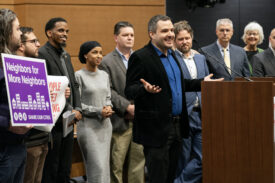In my ongoing analysis of Initiative 933, another story from fast-growing Kitsap County. Today’s question: should a community have a say over where heavy industry belongs?
(Also see the full series of posts.)
The Kitsap County Association of Realtors is opposing the “industrialization of Hood Canal.” The Kitsap Sun reports that the realtors are likely motivated by a large-scale gravel mining and shipping operation under consideration. As might be expected, they are worried it will hurt property values.
An unscientific poll on the paper’s website shows that, as of this writing, 83 percent of respondents favor some form of protection for Hood Canal, or at least planning for industrial development there.
A couple of points are in order. First, Kitsap residents’ concern about their community seems natural enough, but it is precisely the sort of concern that would get trampled by I-933. The initiative would make it nearly impossible for locals to prevent some landowners from engaging in heavy industry.
Second, the realtor’s group is putting their finger on an important feature of land-use planning: property values are affected by what your neighbor can do on his property, not just by what you can do on yours. Your neighbor may make a bundle on gravel mining, but you will lose your shirt when you live next door to a mine. Or stated another way: your neighbor may not be getting the full economic value from his property if he can’t mine for gravel; but then again, if he does start mining, you won’t be getting much value from your property either.
Land-use planning is a balancing act. It can be tough and contentious and everyone will not always get what they want. But it’s a balancing act often best left to local communities, not dictated from above as I-933 would do. There are plenty of examples where I-933 would leave neighbors with at the mercy of whatever development scheme gets cooked up next door. In Kitsap County we have two: a NASCAR racetrack proposal and a huge gravel mine and shipping operation.









Arie v.
This resonates well with rural as well as urban folks “property values are affected by what your neighbor can do on his property”. How can you argue with that? For example none of us want to see a return to rural lot clear cutting – which is what I933 could bring to some rural counties including King. I also like the last paragraph, but it rubs both ways. The King County CAO debacle was caused by *lack* of local community support in the rural areas. I hope that it’s safe to say that we’re all in favor of property rights as long as they are in balance with local community rights. I933 simply does not strike this balance.